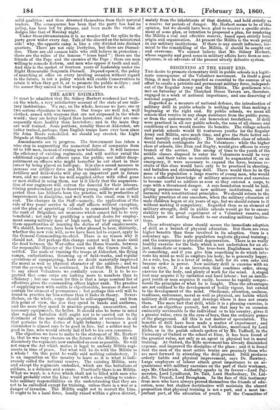THE ARMY ESTIMATES.
IT must be admitted that Mr. Sidney Herbert rendered last week, on the whole, a very satisfactory account of the state of our mili- tary institutions. We say, on the whole, because we have one or two serious objections in reserve. Our troops are well fed, well clothed, armed with weapons that are not surpassed in the whole world; they are better lodged than heretofore, and they are con- sequently more healthy than heretofore ; and in the main they are well trained. Some portions, notably those at Aldershot, are better trained, perhaps, than English troops have ever been sine,e Sir John Moore remodelled, we should say created, the Light Brigade at Shorncliffe.
Amendments are in progress. The Government has taken a wise step in augmenting the numerical force of companies from 80 to 100 men, instead of raising new battalions. It will inorease the efficiency of existing regiments, and will neither entail the additional expense of officers upon the public, nor inffict disap- pointment on officers who might hereafter be cut short in their career by being placed on half-pay. It is also a sound measure to increase our artillery force and the valuable corps of engineers. Artillery and field-works will play an important part in future wars, and we cannot be too well supplied either with rifled guns or men skilled in using them, nor is it likely that the augmenta- tion of our engineers will outrun the demand for their labours. -Giving good-conduct pay to deserving young soldiers at an earlier period than has hitherto been the practice, will be productive of improvement in discipline, and well worth the small sum it will cost. The changes in the Staff—namely, the application of the rule of five years' service to all staff officers without exception, and the plan of appointiog Colonels to command brigades with the rank of Brigadier, are measures which cannot fail to be very beneficial ; not only by gratifying a natural desire for employ- ment among military men of high rank, but by giving more of them opportunities of learning the duties of staff employments. We should, however, have been better pleased to hear, distinctly, whether the new rule will, as we have been led to expect, apply to the General Commanding-in-chief. There is no reason why it should not. But perhaps this change cannot well be made until the feud between the War-office and the Horse Guards, between the responsible Minister of the Crown and the Crown itself, is settled. The mode of training the troops at Aldershot, the flying camps, embarkations, throwing up of field-works, and regular operations of campaigning, have no doubt materially improved the moral as well as physical character of the soldiers ; and we trust the system will be continued. In all that Mr. Herbert had to say about Volunteers we cordially concur. It is to be re- gretted that some corps are looking more to numbers than to efficiency ; but one reason for this is that a large nominal list of effectives gives the commanding officer higher rank. The practice of supplying men with outfits is objectionable, because it does not contain the element of permanence ; but perhaps this evil will be found in practice far less serious than it looks in theory. Never- theless, on the whole, corps should be self-supporting; and from this point of view, the less they spend in bands and uniforms, and the more they spend in practice grounds, ammunition, and necessary equipments, the better. It should also be borne in mind that regular battalion drill ought not to be carried out to the detriment of the more valuable acquisition of excellence in all that pertains to the duties of Light Infantry ; because a good skirmisher is almost sure to be good in line, but a soldier may be good in line, who would utterly fail if left to his own resources.
The objection we have to make to the statement of Mr. Herbert is, that he was very obscure on the future of the Militia. He will disembody the regiments now embodied as soon as possible. He will not renew the Act which makes it legal to embody Militia regi- ments in time of peace. But what will he do with the Militia as a whole ? On this point he really said nothing satisfactory. It is an imposition on the country to leave as it is what is ludi- crously called the national reserve. The existing Militia, save and except the regiments embodied, which are fine battalions of soldiers, is a delusion and a snare. Practically there is no Militia. What we want, is a force which shall not be filled with men who would probably enter the Line ; but with a class willing to under- take military responsibilities on the understanding that they are not to be embodied except for training, unless there is a war or a danger of invasion. The Militia ought not to recruit the Line. It ought to be a local force, locally raised within a given district,
mainly from the inhabitants of that district, and held strictly as a reserve for periods of danger. Mr. Herbert seems to be of this opinion, but we should have been glad to receive a specific state- ment of some plan, or intention to propound a plan, for rendering the Militia a real and effective reserve, based upon strictly local origin and organization. At present the Militia is the weak point in our military institutions. If there is any occult influence, ini- mical to the remodelling of the Militia it should be sought out and overcome. We cannot believe that Mr. Sidney Herbert, whose sagacity and good sense in military affairs have been so con- spicuous, is an advocate of the present utterly delusive system.


























 Previous page
Previous page